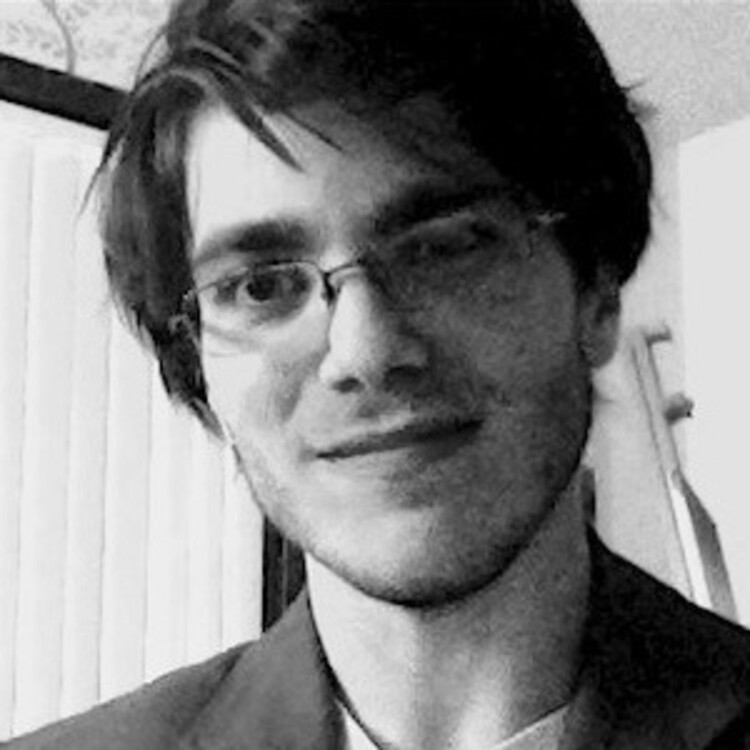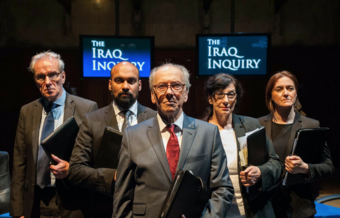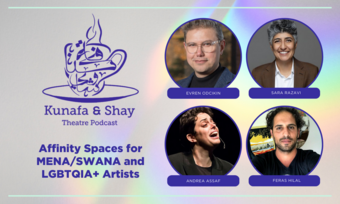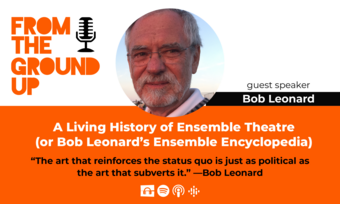Practicing the Art of Freedom
This series on political ideologies in the theater grew out of Caleb Winebrenner’s article responding to Daniel Jones’ post. Each writer was invited to respond to the intersection of political ideology and art in their work.
I have to admit, writing this post was more challenging than I had anticipated. I had already made my case for a libertarian voice in the theater, and had talked at length with the other contributors in this series as to what they wanted to say in response. What else could I add? I wrote drafts about all sorts of ideas around the theater commons, voluntary association, and political identity, and none of it seemed to really reflect what this conversation has meant for me. But then, I came across Daniel Cohen’s TED talk on arguing, and why we argue. He distinguishes two kinds of arguing: “adversarial arguing,” and “cooperative arguing.” He says that one of the biggest gains from arguing is learning. In an adversarial model, he says, the only one who learns something new—like a new way of thinking about an issue—is the loser. Cooperative arguing, on the other hand, means engaging in a discussion that makes you a better person, and in our case, maybe a better artist. Cooperative arguing, I realized, is what has made this series possible.
The other contributors and I certainly don’t all share the same political opinions. But, in addition to having other non-liberals come forward in response, I found that a lot more liberals were open to discussing theater politics like this than I had thought. In my original article, I was eager to defend the existence of a libertarian voice in the theater. But I have to hold myself accountable. If I want a libertarian voice in the theater to be heard, then I myself should listen more closely to the other voices here.
I had ended my earlier article with Paul Rogat Loeb’s call to “seek unlikely allies.” I had meant, at the time, for liberals in the theater to consider libertarians and conservatives as unlikely allies. What I have found in the process of curating this series is that certain liberals have been unlikely allies for me as well—arguing, like I would, for a local, participatory, engaging theater practice, and a theater commons that can accommodate our discussions.
Learning how to have discussions like this one is a part of learning how to use freedom. But beyond that, how can we as theater artists show others how to use it?
It brings to mind a quote from Democracy in America by Alexis de Tocqueville: “Nothing is more wonderful than the art of being free, but nothing is harder to learn how to use than freedom.” Learning how to have discussions like this one is a part of learning how to use freedom. But beyond that, how can we as theater artists show others how to use it? And in opening up to a more politically diverse theater, how can we ensure that the theater we are making is quality, engaging, and provocative—not just simply divided along political fault-lines?
These questions don’t have simple answers, but whatever answers we do find, I believe, forge the common ground that can bring different political ideologies into a space like this one.
As this series has demonstrated, the theatrical practice of freedom centers on our “spect-acting” in the community. But beyond that, I think it really means letting yourself be surprised at the results of how freedom can be practiced. You just might find that political diversity can lead to greater engagement. Going back to what I said before, I suppose I expected a lot of adversarial reactions to proposing a libertarian working in community theater (similar to the adversarial reactions I had gotten in person). Instead, I’ve been met with curiosity and dialogue. That shows the best of what the theater commons has to offer, and shows that while the theater community is still mostly politically liberal, that doesn’t mean that conservatives or libertarians won’t find a place here to discuss the work they do.
There will always be political disagreements in public spaces like this one; that’s just the nature of politics. But if we can agree that local activism, relevant to the needs of our own places, cultures, and concerns is worth doing (like the examples we’ve seen in this series), then we’re off to a good start. As I said in my earlier article, I’m less concerned with politics in general terms than I am with the specific issues in a community. As we’ve seen from this series, that means that political ideologies can be all over the map. Rather than simply indulge our own political biases in this process, we can find our unlikely allies. Our theater can become our activism, and our activism becomes our theater. This is one way to practice that “art of freedom.”
Daniel Jones’s concern about theater being “so seemingly unilateral” is what prompted this whole discussion. What I see now is not a unilateral theater, but a shifting one. As our country is becoming more politically gridlocked, theater-making can actively grease the gears. The theater commons can become one of the public spaces so desperately needed in making civic dialogue something civil again. With that in mind, thank you to all of the contributors and readers of this series. Here’s to carrying on the conversations.
In closing, I’d like to offer a challenge to you, the reader. Go out into your community and find your unlikely allies there. Use the theater you create as a way to form those alliances that can give you a deeper understanding of your ideas, and a more nuanced context for your ideals. Create a commons in your community that is less divided by politics and more united by the art and the issues.

















Comments
The article is just the start of the conversation—we want to know what you think about this subject, too! HowlRound is a space for knowledge-sharing, and we welcome spirited, thoughtful, and on-topic dialogue. Find our full comments policy here
keep writing and keep working in the communities - that change that we as artists desire is always in the DOING... that is the hardest part.
Certain areas of theater should be a likely place for libertarians to find a home. Within the more experimental and younger companies, you might expect at least tolerance, of not outright support for, some libertarian social ideas like legalized drugs, sexual freedom and enthusiastic support for freedom of expression. That said, I have run into issues of political correctness in those circumstances, not generally with my fellow artists but with the intended audience. Years ago I was involved with a production of For Colored Girls where we used a multiracial cast. A local feminist bookstore was outraged and protested. We had to deal with it.
For social conservatives it might be harder to find a home though within community theaters devoted to producing the American chestnuts, you'd have a shot.
As for the other elements of right wing thought, it cuts both ways. I could see an argument in favor, for example, of encouraging private philanthropy and patronage by supporting generally low taxes. Not a position I share, but I get the reasoning.
Seems like it can be done and, in any event, political dogma doesn't serve art all that well. I believe that even Brecht would chafe under the current bourgeois liberalism of much American art. Anything that is truly challenging is going to break boundaries.